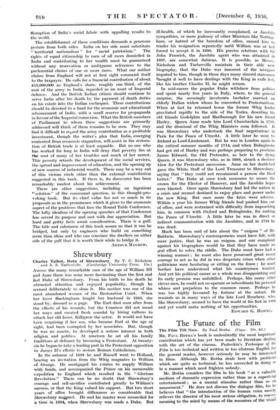Shrewsbury
Charles Talbot, Duke of Shrewsbury. By T. C. Nicholson and A. S. Turberville. (Cambridge University Press. 15s.) AMONG the many remarkable men of the age of William III And Anne there was none more fascinating than the first and last Duke of Shrewsbury. From his birth to his death he attracted attention and enjoyed popularity, though he seemed deliberately to shun it. His mother was one of the most abandoned women of the Restoration Court. When her lover Buckingham fought her husband in 1668, she stood by, dressed as a page. The Earl died soon after from the effects of his wounds, but the Countess did not mend her ways and created fresh scandal by hiring ruffians to attack her old lover, Killigrew the actor. It would not have been surprising if her son, who became Earl at the age of eight, had been corrupted by her associates. But, though he was no ascetic, he developed a serious interest in both religion and politics. At nineteen he set all his family
• traditions at defiance by becoming a Protestant. At twenty- six he began to take a leading part in the Protestant opposition to James II's efforts to restore Roman Catholicism.
In the autumn of 1688 he and Russell went to Holland, bearing an invitation from the Whig magnates to William of Orange. He mortgaged his estates to supply William with funds, and accompanied the Prince on his memorable expedition to England which resulted in the " Glorious Revolution." There can be no doubt that Shrewsbury's courage and self-sacrifice contributed greatly to William's success, or that the King valued his support. But two short years of office brought differences so considerable that Shrewsbury resigned. He and his master were reconciled for a time in 1696, when Shrewsbury was made a Duke. But
ill-health, of which he incessantly complained, or Jacobite sympathies, or mere jealousy of other Ministers like Notting. ham, or hatred of the boredom of office, caused him to tender his resignation repeatedly until William was at last forced to accept it in 1698. His precise relations with Sir John Fenwick, the Jacobite agent who was attainted in 1697, are somewhat dubious. It is possible, as Messrs. Nicholson and Turberville maintain in their able new biography, that the Duke was innocent of the intrigues imputed to him, though in those days many shrewd statesmen thought it well to have dealings with the King in exile lest, like his brother Charles II, he might return.
In mid-career the popular Duke withdrew from politics and spent nearly five years in Italy, where, to the general surprise, the seemingly inveterate bachelor married an elderly Italian widow whom he converted to Protestantism. When at last he returned home the former Whig leader gravitated rapidly to the side of the Tories, deserting his old friends Godolphin and Marlborough for his new friend Harley. Queen Anne made him Lord Chamberlain in 1710, and the dismissal of the Whig Ministers soon followed. It was Shrewsbury who undertook the final negotiations in Paris for the Peace of Utrecht. A little later he went to Ireland as Lord-Lieutenant. But he was in London again in the critical summer months of 1714, and when Bolingbroke had got rid of Harley and was perhaps preparing to proclaim James Edward, the Old Pretender, as heir to the dying Queen, it was Shrewsbury who, as in 1688, struck a decisive blow for the Protestant succession. Anne on her death-bed gave the White Staff of the Lord Treasurer to Shrewsbury, saying that " they could not recommend a person she liked better." The Duke at once took measures to secure the crown for the Elector of Hanover, and the Jacobite hopes were blasted. Once again Shrewsbury had led the nation in a crisis and seemed destined to enjoy place and power under the new King. But once more the fates were adverse. Within a year his former Whig friends had pushed him out of office, and were restrained with difficulty from impeaching him, in common with Oxford and Bolingbroke, for making the Peace of Utrecht. A little later he was in direct or indirect communication with the Jacobites, and in 1718 he was dead.
Much has been said of late about the " enigma " of Mr. Baldwin. Shrewsbury's contemporaries must have felt, with mere justice, that he was an enigma, and our complaint against his biographers would be that they have made no real effort to solve the riddle. The Duke must have had a winning manner ; he must also have possessed great moral courage to act as he did in two desperate crises when other politicians were hesitating or sitting on the fence ; he must further have understood what his countrymen wanted. And yet his political career as a whole was disappointing and its early promise was unfulfilled. Perhaps, like many other clever men, he could not co-operate or subordinate his personal whims and prejudices to the common cause. Perhaps he was too highly favoured by fortune at the outset. lie reminds us in many ways of the late Lord Rosebery, who, like Shrewsbury, seemed to have the world at his feet in 1894 and yet could make nothing of his opportunities.
EDWARD G. Hawse..


























































 Previous page
Previous page